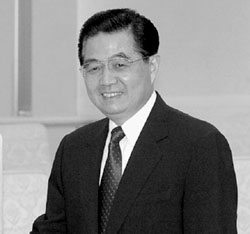|
observer |
|
|
|
|
|
OTHER LINKS |

|

|

|
China in major fence-mending exercise in S.Asia
China is the burgeoning global economic power to watch. Having completed a ground-breaking visit to India recently, Chinese President Hu Jintao also visited Pakistan, China's decades long closest ally in South Asia - in a fine balancing act which graphically illustrates the increasing and even conflicting foreign policy compulsions on China, the "world's fastest growing economy." If official attire is a pointer to new foreign policy orientations, then, the Western lounge suits worn by China's current political leadership speak volumes for the distance China has travelled over the years as a global economic and political power and the fresh ground it is breaking in the sphere of foreign policy parameters and principles. Gone are those stiff and tight bureaucratic tunics of the Mao Tse Dong era, for instance, which marked off the Chinese political leadership of those days from its Western counterparts. Today, in terms of dress code the Chinese political leadership is an easy match for the seeming sartorial sophistication of its equal numbers in the West. Western attire has come to characterize the Chinese political leadership, and this remarkable transitional change in "externals" should be seen as symbolic of the drastically new orientation China is giving its foreign policy. China is no insular, inward-looking player on the world stage. It is reaching out to the rest of the world in keeping with the spirit of economic globalisation and this is seen in even the Western sartorial niceties exuded by the current Chinese political leadership. President Hu Jintao's recent visit to India, which is of truly epochal proportions, given the years of strained, Sino-Indian ties over mainly the countries' border dispute, should be seen as expressive of this fresh openness in China's foreign policy. China is reaching out to its most important neighbours in a fence - mending, no less than ground-breaking exercise. DevelopmentsThese developments, of course, auger well for the security environment in this part of the world which has hitherto been characterized mainly by the Indo-Pakistani and Sino-Indian feuds. It would not be wrong to surmise that economics would take over from politics in mainly the Sino-Indian equation. While one could be certain that the long-simmering territorial dispute between India and China would remain a contentious issue, the fact that India's economic fortunes are on the upswing are likely to prove an asset in the eyes of China for whom global economic penetration is now a priority. It is this consideration which is compelling China to enter into closer economic interaction with India. The Chinese President's visit to India marks a heightening of this process of economic interaction. It does not follow from these premises that geopolitics is a thing of the past in the foreign policy thinking of these major powers of Asia. China's decision to heighten its presence in South Asia is very likely prompted by its drive to upstage the US in this region and to also eclipse to the extent possible Japan's increasingly assertive presence in South Asian affairs. To be sure, economic interests are a decisive influence in shaping China's regional policy but changing power configurations in Asia are also likely to weigh heavily with it. In other words, Realpolitik continues to be a shaping influence in the international politics of this region but is very much subordinate to economics. At the moment it is India's market size and her investment possibilities which are the pull factors for China. Economic interactionAlthough politics would continue to have a bearing on Sino-Indian ties, the prospect is not unlikely that heightened economic interaction between the States would facilitate the resolution of bilateral disputes; the unresolved territorial dispute being one of these. Meanwhile, China would like to keep its time-tested relations with Pakistan in good shape. As long as the major States in the Asian region do not consider it necessary to contain their military capabilities, the strong linkage between China and Pakistan would act as an effective counterweight against these perceived power imbalances. |









